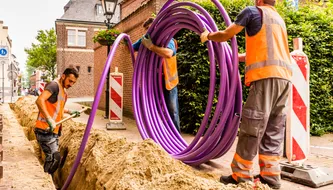Burundi and Zambia have entered into a landmark agreement to enhance their digital connectivity by installing an underwater fibre optic cable.
The deal was formalized through a Memorandum of Understanding (MoU) signed during the recent Digital Government Africa Summit, held in Lusaka, Zambia.
A private company, whose name remains undisclosed, has been commissioned to install the fibre optic cable beneath Lake Tanganyika. This cable will connect Zambia’s Northern Province to Burundi’s southern Makamba Province and improve the digital infrastructure between the two countries.
The project is already well underway, with 350 kilometres of cable already laid. Once complete, the initiative will position Zambia as a vital hub for Information and Communication Technology (ICT) in the region, enhancing communication speeds and reliability.
- Advertisement -
Felix Mutati, Zambia’s Minister of Science and Technology, highlighted the strategic importance of the project. He noted that the new connection will not only strengthen digital ties between Zambia and Burundi but also enable Burundi to connect more effectively with other Southern and Eastern African nations.
Burundi will become the ninth country to connect to Zambia via fibre optic cable, joining Angola, Botswana, the Democratic Republic of the Congo, Malawi, Mozambique, Namibia, Tanzania, and Zimbabwe.
Léocadie Ndacayisaba, Burundi’s Minister of Communication, Technology, and Information, called the agreement a transformative milestone. She emphasized that it will pave the way for better internet access, improved communication, and an overall enhanced quality of life for citizens of both nations.
In February 2024, Burundi completed the first phase of its national fibre optic network. This development is expected to increase internet penetration to 18.33%, with 2.51 million households gaining access by the end of 2024.
Zambia, also in February 2024, announced the construction of 60 new 4G mobile towers aimed at improving internet connectivity in rural areas with plans to build digital centers providing free internet services to citizens and achieve 96% phone and internet coverage by the end of 2025.










